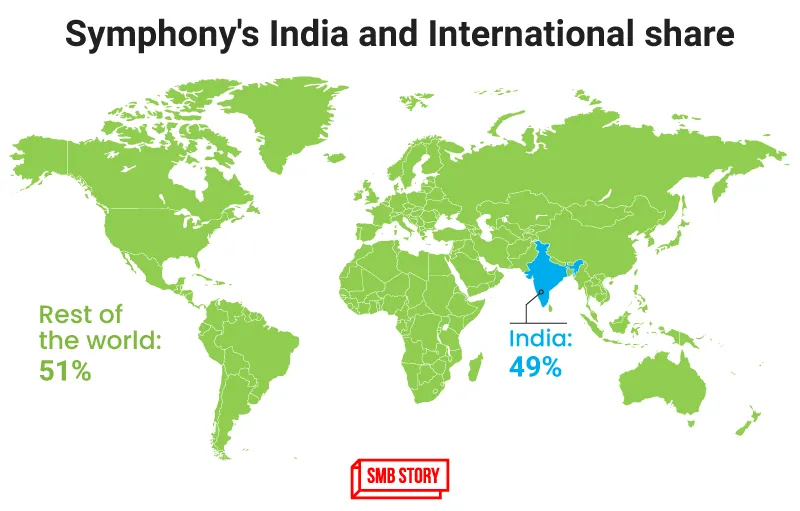Bouncing back after bankruptcy: The story of world’s largest air cooler maker Symphony
Symphony Limited began its journey in 1988 when Achal Bakeri decided to give air coolers a facelift. The company is now one of the world’s largest air cooler makers with presence in 60 countries.
Symphony Limited’s legacy dates back to 1988, at a time when having an air cooler at home was considered luxury in India.
Over the years, founder Achal Bakeri (62), has kept his cool despite the many headwinds faced by the company—from starting in a nascent market, multiple product failures, bankruptcy to the increase in competition and of course, the COVID-19 pandemic.
Today Symphony, which operates in a single category, is a Rs 637.51 crore turnover company (Symphony India) and consolidated turnover of Rs 1,039 crore, with 49% revenue share from the Indian market and 51% from around the world.
Leveraging direct-to-consumer (D2C) has given a second wind to the Ahmedabad-based company. From almost failing in the domestic market, the iconic Made in India air cooler manufacturer currently has a presence in 60 countries.
Symphony’s net sales stood at Rs 329 crore in June 2022 up 43.04% from Rs 230 crore in June 2021. Quarterly net profit stood at Rs 29 crore in June 2022 up 383.33% from Rs 6 crore in June 2021. According to Forbes, Symphony is the world's largest producer of air coolers, selling over 1.2 million units annually.
In an interview with SMBStory, Bakeri charts Symphony’s D2C growth and expansion plans. He also weighs in on the comparison between air conditioners versus coolers, talks about the company’s initiatives to tackle climate change and more.
From bankruptcy to bouncing back
Bakeri launched Symphony in 1988 to bring aesthetics to the world of air coolers, albeit on a budget.
For any new entrepreneur, especially in the product category, selling off all the units from the first batch can be overwhelming; however, Bakeri sold the entire lot by the end of the first summer of his business inception.
In 1994 Symphony got listed on the Bombay Stock Exchange but a series of events and some mistakes in judgment and execution led to Symphony filing for bankruptcy in 2001.
Symphony’s business was growing by leaps and bounds in the 90s and by the late 90s it had also crossed international boundaries. However, going by the success of operating in a single category, Bakeri believed that air coolers are a seasonal product. He hoped that foraying into other categories would help him scale his business. This is when things started to backfire.
Symphony added washing machines, water heaters, air conditioners, and exhaust fans, among others to its portfolio, but none of them clicked with the market. Bakeri says the products were way ahead of their time.
“An entrepreneur can dream big, but you know it takes a while for dreams to materialise and everything can't happen overnight. And so probably they were mistakes in judgment getting into too many products at that time. We were a small company then and we did not have the resources we shouldn't have. We shouldn't have expanded so rapidly,” says Bakeri.
Bakeri spent the next decade rebuilding Symphony.
His determination and hard work not only helped Symphony survive, but the company emerged stronger.
Today, Symphony is the world's largest manufacturer of air coolers. It has 419 trademarks, 82 registered designs, 20 copyrights and 51 patents.
Innovations fuelling growth
Symphony acquired Mexico-based International Metal Products Co (IMPCo) in 2008 and in 2015, took over China’s largest air-cooler company that sells products under the brand Keruilai. The acquisitions helped Bakeri scale up the business.
For the last few years, innovation has been the key to the success of Symphony air coolers as the company introduced tabletop cooler Duet, meant for personal usage, smart technology of app control to Diet 3D 55i+ cooler range, and many more.
During the pandemic, Symphony further diversified with an omnichannel approach and launched its D2C wing. COVID-19 hit India during two successive summer months, which led to the company witnessing an increase in online business.
“In the summer of 2022 we scaled up our D2C business and at the same time we collaborated with Disney to launch a new air cooler collection for kids rooms,” Bakeri adds.

Image credits YS Design
Global dreams
Symphony is expanding its business overseas. Bakeri says the company has recently opened a subsidiary of Symphony in Brazil.
In the US, Symphony is expanding its sales and has witnessed significant growth in the last 2-3 years, and the company is trying to set up a distribution network in Europe.
But there have been recent headwinds, with the Russia-Ukraine war affecting its manufacturing process as its supply chains have taken a hit.
AC vs air cooler?
Given the rise in disposable income in urban India and easy payment options, people are switching over to air conditioners.
When asked how Symphony is addressing this change in consumer behaviour, Bakeri explains that despite air conditioners’ popularity, air coolers will continue to maintain their presence.
“There is a compelling advantage of air cooler over air conditioners is that they consume less electricity. Number two, coolers are portable, you can simply place the same cooler in different places at your home. Coolers can also be used outdoors. Even if the house is fully-air conditioned, people use air cooler in their balcony or in the garden or the terrace. It is also useful for their security cabins or their staff quarters,” he says
He believes Symphony air coolers are here to stay.
“We capture 50 percent market share by value in the Indian household in the organised sector and there is enormous headroom for growth,” the founder adds.
The company has also introduced residential tower fans—a cooler minus the water—as a new product category. Symphony has also set its sights on industrial coolers.
“As far as the industrial coolers are concerned, the challenge is that the market does not exist. We are going out and educating customers that their factory or warehouse doesn't have to be so hot. The workers in the factory don't have to work in such inhuman conditions and they can provide them comfort at a very small cost which will increase their productivity and motivation to work,” he says.
Talking about the ESG (environment, social and governance) initiatives, Bakeri says that recently the company did a carbon footprint assessment for its products. The report said that a single unit of any air cooler, if used in place of an AC, can help save 14 trees every year.
“As a part of our CSR initiatives, we took up an urban landscape project to establish Symphony Forest Park. With the ultimate aim to revamp an abandoned patch of land ranging 11,000 square meters,” he adds.
(The article has been updated to correct certain numbers erroneously shared by the company on its consolidated turnover, revenue share, and the environmental impact of using air coolers.)
Edited by Affirunisa Kankudti









